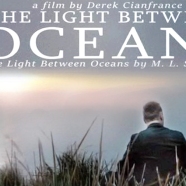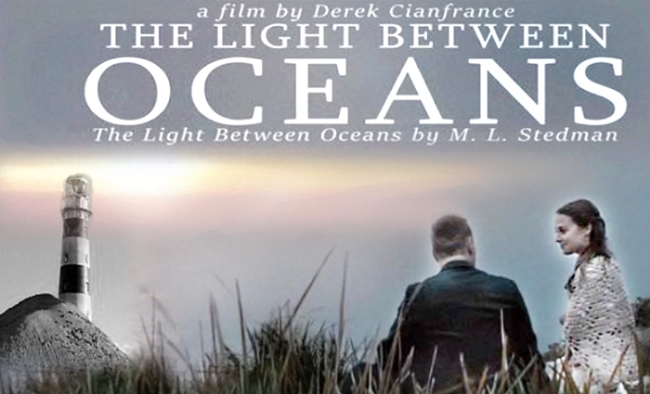 November
10
November
10
Tags
The Light Between Oceans (2016)

Every now and then a film comes along that reminds us of how beautiful and powerful cinema can be when it stays close to its artistic roots. Like primal colours and confident brushstrokes in a classic painting, a great film depicts strong emotion, sprung from critical life choices, in a bold palette, against natural settings. The Light Between Oceans (2016) is a beautiful and emotionally strong film. Set against a visually stunning lighthouse that stands between two raging oceans, the film’s title and place is a metaphor for an irresolvable ethical dilemma and the power of self-sacrificing love.
We meet Tom (Michael Fassbender) as an upright and emotionally scarred veteran of World War ! who seeks isolation as a lightkeeper on the lonely Western Australia coast. Soon after taking the position he marries Isabel (Alicia Vikander) and their lives are idyllic amidst the splendour of the rugged headland and its majestic beacon. But dark clouds gather after two miscarriages, and Tom is helpless to give Isobel the happiness he so desperately craves for her.
Fatefully, the roaring oceans offer up an abandoned boat with a dead man and a live baby. Despite Tom’s deep sense of wrong, they bury the body and keep the child as their own, bringing Isobel unbounded maternal joy. He later learns of a woman who lost a husband and child at sea and is tormented by their deception. They love the child, but Tom cannot continue knowing the grief his actions have caused. When he reveals the truth their world collapses.
Melodrama is inevitable in a romantic period drama and it flows freely across the landscape, the plot, and the characters. Everything about this film is intense: the deafening sound of the seas; the extraordinary beauty of the rocky headland; classically framed cinematography; and the joy and pain of Tom and Isobel’s lives. At times this intensity feels forced, as if the director is trying too hard to make us smile or cry on cue. There is little subtlety in the symbolism of clashing oceans as the echo-chamber for the conflict between happiness and doing what is right.
This film’s relentlessly poetic visual and emotional tensions can leave little room for an audience to catch its breath, but this is not unusual in the romantic period genre. The performances of the co-stars are superb: Fassbender is stoic, tense, and brooding throughout and is balanced by the exuberantly beautiful Vikander. Supported by a cast of top-shelf stars and a musical score that resonates with the film’s visual pleasures, this is a morally thoughtful film with an epic quality that lingers.

Director: Derek Cianfrance
Stars: Michael Fassbender, Alicia Vikander

Hi Cinemuse, While I love your reviews in general, I didn’t enjoy this film. In my opinion, this film will divide audiences, enchanting those millions who have read the book and other lovers of weepy films, and alienating some others who have little patience for the slow, measured, interminable family sagas of yesteryear, where time drags on the characters to be borne stoically while they bear another generation to perhaps enjoy life. Unfortunately I have become one of the latter group, but I noted lots of rapt looks amongst older filmgoers here in Europe, many of whom admitted familiarity with the book. For me, the film was slow, obvious and by the end uninvolving. And don’t get me started on the lack of ‘Australianness’ in the main characters and the film. I understand it was designed for international audiences who seek a universal story, but to an Australian viewer it was a little disappointing.
LikeLiked by 1 person
Thanks for sharing your thoughts here ozflicks. I can understand your disappointment even though my reactions were different. Some of the issues you raise are part of any period melodrama that aims to be a high-fidelity adaptation of a novel and others relate to directorial decisions. Perhaps once the epically stunning landscape was found, the slow interpretation of the novel was inevitable. On the other hand, I wondered why Vikander is so conspicuously tanned in an era that valued feminine whiteness and did Fassbinder need to be so permanently ponderous? For me the film’s achievements go beyond such considerations, but I do confess that Vikander casts a spell on me.
LikeLike
I liked the film (currently reading the book) and I also enthused about it on my site… Its rawness gripped me from beginning to end.
LikeLiked by 1 person
A sad film with sadder characters but I thought had beautiful cinematography. Because it is a thoughtful film, the pace is thoughtful and slow, making one feel at times the director is overindulgent. But, it can be a hit or miss type of movie, depending on your bent toward art and life
LikeLiked by 1 person
I agree. Thats why the reviews are so mixed.
LikeLiked by 1 person
You’ve been very kind with your review of this film. Admittedly, I may be prejudiced because I read the book some years ago now, and thought it was appalling drivel!
Maybe I saw the film with a jaundiced eye! With such a great cast it would be difficult to fail, but words from the book crept in to sabotage any enjoyment I may have had. Sorry.
LikeLike
The book to film transition is indeed full of traps. Maybe I was unburdened by the written word.
LikeLiked by 1 person